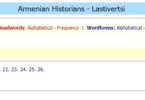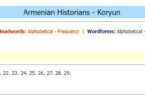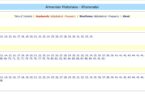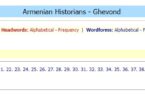Prepared Remarks of
Thomas J. Samuelian, Dean, AUA College of Humanities & Social Sciences
Opening of the Conference on the 240th of the US Declaration of Independence
American University of Armenia
October 17, 2016
Welcome to the American University of Armenia. I’m Tom Samuelian, Dean of the College of Humanities & Social Sciences. It is natural and fitting that this conference dedicated to the 240th anniversary of the Declaration of Independence should be held at the American University of Armenia. However, for the delegates looking out the window of Independence Hall in 1776, it might have seemed improbable that there would be a conference about their declaration in far off Armenia 240 years later. No doubt US Independence seemed improbable to many during the heated debates that sultry summer in Philadelphia in 1776. Just as Armenia’s regained statehood and independence would likely have seemed improbable to Shahamirian in 1773 in Madras, when he penned Vorogayt Parats, a work similarly inspired by the Enlightenment, about which our colleagues will speak later in the conference.
The delegates in Philadelphia were already citizens of the world, many of them children and grandchildren of people persecuted for their beliefs, pioneers in search of a better society, where the principles of Christianity were freely and tolerantly practiced as a civic creed without the overlay of power, doctrine or denomination. As is only fitting for delegates gathered in the city of Brotherly Love, Phil-adelph-ia, they saw people as equal children of the one and same Creator. “We hold these truths to be self-evident, that all men are created equal, that they are endowed by their Creator with certain unalienable Rights.”
Well, not quite all and not quite equal. There were blacks, native Americans, and of course women, who would have to wait for a century or more for rhetoric to become reality. Here too there is an important lesson: as important as it is to declare, it is also important to believe in the process of change (“When in the course of human events” – It’s a course, not a static state), evolving, transforming and progressing toward perfection. As the US Constitution reminds us “In order to form a more perfect union . . .”
And in parallel, half way around the world, this same political rhetoric made its way to the Armenians in Madras. Armenians have always been quick to adopt new ideas, and it is not surprising that the ideas of freedom and democracy grounded in Christian values would find resonance among Armenians.
But back to the Puritans and Quakers in America in 1776, for whom the gap between ideals and reality, preaching and practice, was a constant spur to reform. For them, almost everything could be endured, but not hypocrisy. Although the political rhetoric of the Declaration of Independence remained aspirational, it was hardly dormant. It reemerged as the battle hymn of the anti-slavery movement leading to the US Civil War and Emancipation Proclamation. This rhetoric was now recast in the Biblical cadences of Lincoln’s Gettysburg Address “Four score and seven years ago, our fathers brought forth on this continent a new nation, conceived in liberty, and dedicated to the proposition that all men are created equal . . .”
Yet for much of the still subjugated and colonialized world, this was but fine talk that may have worked in the fabled lands in the New World, but not in the Old World or Third World.
It took a third American, again a President, to turn this political rhetoric into an international legal norm: Woodrow Wilson, a name justly celebrated by Armenians who have rarely had a more prominent or eloquent champion, with his 14 Points, the right of self-determination, and his arbitral award for free Armenia.
This right redrew the map of the world in the 20th century and is an active ingredient in the undone business of civilizing humanity, liberating people from racism, persecution, and colonialism. It continues its action in many places in the world, including Artsakh, where self- determination is urgently sought as the only effective guarantee of dignity, peace, security and survival.
Does the aspiration sound familiar? It should. Straight from Philadelphia in 1776. The Declaration of Independence and the principle of self-determination it enunciates have gone forth and multiplied and are now part of world culture.
We express our thanks to our co-sponsors, the US Embassy, the Yerevan State University Department of World History, and the Armenian Historical Association, and wish you fruitful deliberations.







